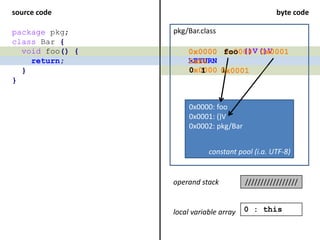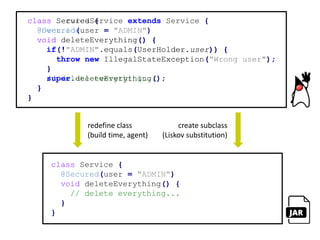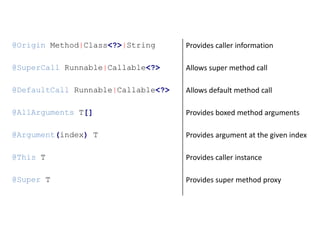Java byte code in practice
- 1. Java byte code in practice
- 2. 0xCAFEBABE source code byte code JVM javac scalac groovyc jrubyc JIT compilerinterpreter class loader creates reads runs
- 3. source code byte code void foo() { } RETURNreturn; 0xB1
- 4. source code byte code int foo() { return 1 + 2; } ICONST_1 ICONST_2 IADD operand stack 1 2 13 IRETURN 0x04 0x05 0x60 0xAC
- 5. source code byte code ICONST_2 IADD IRETURN BIPUSH int foo() { return 11 + 2; } operand stack 11 2 1113 0x05 0x60 0xAC 0x10 110x0B
- 6. source code byte code int foo(int i) { return i + 1; } ILOAD_1 ICONST_1 IADD IRETURN operand stack local variable array 1 : i 0 : this i 1 ii + 1 0x1B 0x04 0x60 0xAC
- 7. source code byte code long foo(long i) { return i + 1L; } LLOAD_1 LCONST_1 LADD LRETURN operand stack local variable array 2 : i (cn.) 1 : i 0 : this i (cn.) i 0x1F 0x0A 0x61 0xAD i (cn.) i 1L 1L (cn.) i + 1L i + 1L (cn.)
- 8. source code byte code short foo(short i) { return (short) (i + 1); } ILOAD_1 ICONST_1 IADD I2S IRETURN operand stack local variable array 1 : i 0 : this 1 iii + 1 0x1B 0x04 0x60 0x93 0xAC
- 9. source code byte code pkg/Bar.class void foo() { return; } RETURN package pkg; class Bar { } constant pool (i.a. UTF-8) 0x0000 0x0000: foo 0x0001: ()V 0x0002: pkg/Bar 0xB1 0x0000 0x0000foo ()V()V0x0001 0x00000 1 10x0001 operand stack ///////////////// local variable array 0 : this
- 10. Java type JVM type (non-array) JVM descriptor stack slots boolean I Z 1 byte B 1 short S 1 char C 1 int I 1 long L J 2 float F F 1 double D D 2 void - V 0 java.lang.Object A Ljava/lang/Object; 1
- 11. source code byte code package pkg; class Bar { int foo(int i) { return foo(i + 1); } } ILOAD_1 ICONST_1 IADD INVOKEVIRTUAL pkg/Bar foo (I)I ALOAD_0 IRETURN operand stack local variable array 1 : i 0 : this this i 1 this ii + 1 foo(i + 1) 0x2A 0x1B 0x04 0x60 0xAC 0xB6 constant pool 0x0002 0x0000 0x0001
- 12. INVOKESPECIAL INVOKEVIRTUAL INVOKESTATIC INVOKEINTERFACE INVOKEDYNAMIC Invokes a static method. pkg/Bar foo ()V pkg/Bar foo ()V Invokes the most-specific version of an inherited method on a non-interface class. pkg/Bar foo ()V Invokes a super class‘s version of an inherited method. Invokes a “constructor method”. Invokes a private method. Invokes an interface default method (Java 8). pkg/Bar foo ()V Invokes an interface method. (Similar to INVOKEVIRTUAL but without virtual method table index optimization.) foo ()V bootstrap Queries the given bootstrap method for locating a method implementation at runtime. (MethodHandle: Combines a specific method and an INVOKE* instruction.)
- 13. void foo() { ???(); // invokedynamic } foo() ? qux() bootstrap() bar() void foo() { bar(); } In theory, this could be achieved by using reflection. However, using invokedynamic offers a more native approach. This is especially important when dealing with primitive types (double boxing). Used to implement lambda expressions, more important for dynamic languages.
- 14. interface Framework { <T> Class<? extends T> secure(Class<T> type); } class Service { @Secured(user = "ADMIN") void deleteEverything() { // delete everything... } } @interface Secured { String user(); } class SecurityHolder { static String user = "ANONYMOUS"; } does not know aboutdepends on discoversatruntime
- 15. class Service { @Secured(user = "ADMIN") void deleteEverything() { if(!"ADMIN".equals(UserHolder.user)) { throw new IllegalStateException("Wrong user"); } // delete everything... } } redefine class (build time, agent) create subclass (Liskov substitution) class SecuredService extends Service { @Override void deleteEverything() { if(!"ADMIN".equals(UserHolder.user)) { throw new IllegalStateException("Wrong user"); } super.deleteEverything(); } } class Service { @Secured(user = "ADMIN") void deleteEverything() { // delete everything... } }
- 16. The “black magic” prejudice. var service = { /* @Secured(user = "ADMIN") */ deleteEverything: function () { // delete everything ... } } function run(service) { service.deleteEverything(); } In dynamic languages (also those running on the JVM) this concept is applied a lot! For framework implementors, type-safety is conceptually impossible. But with type information available, we are at least able to fail fast when generating code at runtime in case that types do not match. No type, no problem. (“duck typing”)
- 17. class Method { Object invoke(Object obj, Object... args) throws IllegalAccessException, IllegalArgumentException, InvocationTargetException; } class Class { Method getDeclaredMethod(String name, Class<?>... parameterTypes) throws NoSuchMethodException, SecurityException; } Isn’t reflection meant for this? Reflection implies neither type-safety nor a notion of fail-fast. Note: there are no performance gains when using code generation over reflection! Thus, runtime code generation only makes sense for user type enhancement: While the framework code is less type safe, this type-unsafety does not spoil the user‘s code.
- 18. Class<?> dynamicType = new ByteBuddy() .subclass(Object.class) .method(named("toString")) .intercept(value("Hello World!")) .make() .load(getClass().getClassLoader(), ClassLoadingStrategy.Default.WRAPPER) .getLoaded(); assertThat(dynamicType.newInstance().toString(), is("Hello World!")); Byte Buddy: subclass creation
- 19. class MyInterceptor { static String intercept() { return "Hello World"; } } identifiesbestmatch Class<?> dynamicType = new ByteBuddy() .subclass(Object.class) .method(named("toString")) .intercept(to(MyInterceptor.class)) .make() .load(getClass().getClassLoader(), ClassLoadingStrategy.Default.WRAPPER) .getLoaded(); Byte Buddy: invocation delegation
- 20. Annotations that are not on the class path are ignored at runtime. Thus, Byte Buddy’s classes can be used without Byte Buddy on the class path. class MyInterceptor { static String intercept(@Origin Method m) { return "Hello World from " + m.getName(); } } Class<?> dynamicType = new ByteBuddy() .subclass(Object.class) .method(named("toString")) .intercept(to(MyInterceptor.class)) .make() .load(getClass().getClassLoader(), ClassLoadingStrategy.Default.WRAPPER) .getLoaded(); providesarguments Byte Buddy: invocation delegation (2)
- 21. @Origin Method|Class<?>|String Provides caller information @SuperCall Runnable|Callable<?> Allows super method call @DefaultCall Runnable|Callable<?> Allows default method call @AllArguments T[] Provides boxed method arguments @Argument(index) T Provides argument at the given index @This T Provides caller instance @Super T Provides super method proxy Byte Buddy: dependency injection
- 22. class Foo { String bar() { return "bar"; } } Foo foo = new Foo(); new ByteBuddy() .redefine(Foo.class) .method(named("bar")) .intercept(value("Hello World!")) .make() .load(Foo.class.getClassLoader(), ClassReloadingStrategy.installedAgent()); assertThat(foo.bar(), is("Hello World!")); The instrumentation API does not allow introduction of new methods. This might change with JEP-159: Enhanced Class Redefiniton. Byte Buddy: runtime Hot Swap
- 23. class Foo { String bar() { return "bar"; } } assertThat(new Foo().bar(), is("Hello World!")); public static void premain(String arguments, Instrumentation instrumentation) { new AgentBuilder.Default() .rebase(named("Foo")) .transform( (builder, type) -> builder .method(named("bar")) .intercept(value("Hello World!")); ) .installOn(instrumentation); } Byte Buddy: Java agents
- 24. Java virtual machine [stack, JIT] Dalvik virtual machine [register, JIT] Android runtime [register, AOT] Android makes things more complicated. Solution: Embed the Android SDK’s dex compiler (Apache 2.0 license). Unfortunately, no recent version central repository deployments of Android SDK.
- 25. Byte Buddy cglib Javassist Java proxy (1) 60.995 234.488 145.412 68.706 (2a) 153.800 804.000 706.878 973.650 (2b) 0.001 0.002 0.009 0.005 (3a) 172.126 1’850.567 1’480.525 625.778 n/a (3b) 0.002 0.003 0.019 0.027 n/a All benchmarks run with JMH, source code: https://github.com/raphw/byte-buddy (1) Extending the Object class without any methods but with a default constructor (2a) Implementing an interface with 18 methods, method stubs (2b) Executing a method of this interface (3a) Extending a class with 18 methods, super method invocation (3b) Executing a method of this class





















![@Origin Method|Class<?>|String Provides caller information
@SuperCall Runnable|Callable<?> Allows super method call
@DefaultCall Runnable|Callable<?> Allows default method call
@AllArguments T[] Provides boxed method arguments
@Argument(index) T Provides argument at the given index
@This T Provides caller instance
@Super T Provides super method proxy
Byte Buddy: dependency injection](https://image.slidesharecdn.com/javabytecodeinpractice-140915035823-phpapp01/85/Java-byte-code-in-practice-21-320.jpg)


![Java virtual
machine
[stack, JIT]
Dalvik virtual
machine
[register, JIT]
Android
runtime
[register, AOT]
Android makes things more complicated.
Solution: Embed the Android SDK’s dex compiler (Apache 2.0 license).
Unfortunately, no recent version central repository deployments of Android SDK.](https://image.slidesharecdn.com/javabytecodeinpractice-140915035823-phpapp01/85/Java-byte-code-in-practice-24-320.jpg)

